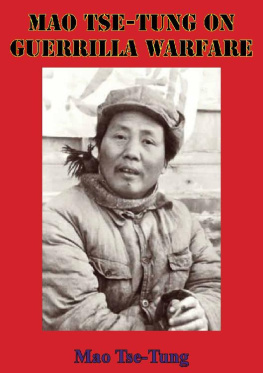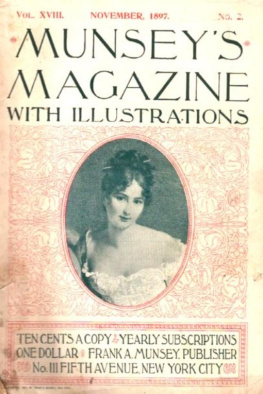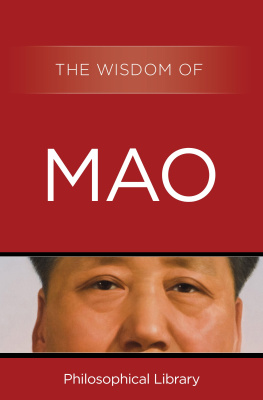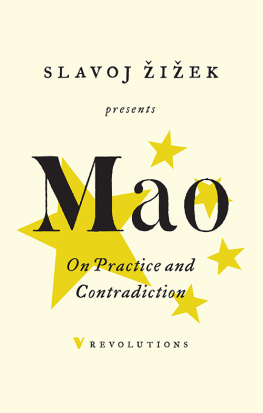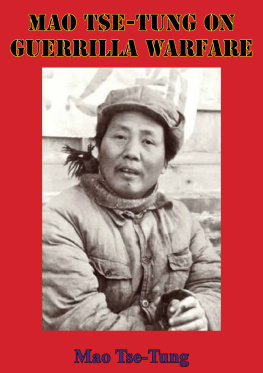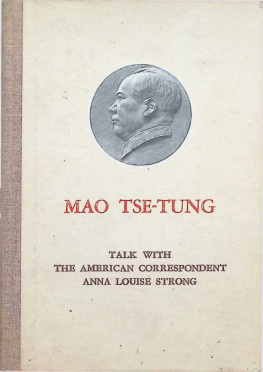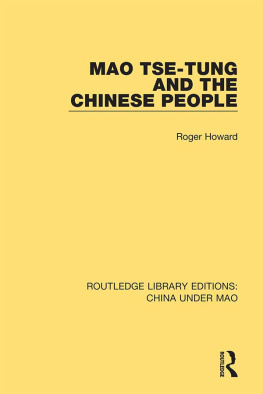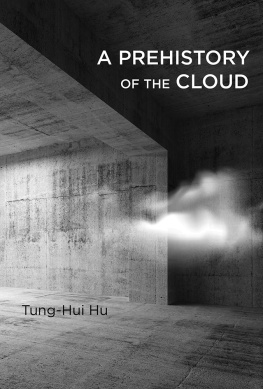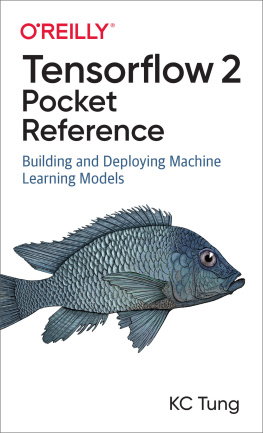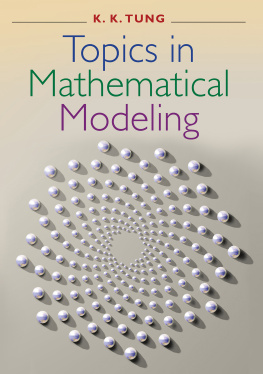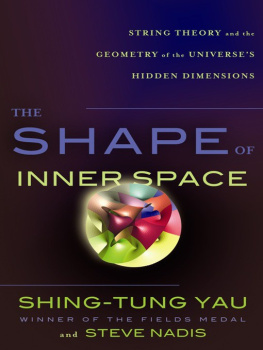Mao Tse-Tung - Mao Tse-Tung on Guerrilla Warfare
Here you can read online Mao Tse-Tung - Mao Tse-Tung on Guerrilla Warfare full text of the book (entire story) in english for free. Download pdf and epub, get meaning, cover and reviews about this ebook. year: 2011, publisher: PICKLE PARTNERS PUBLISHING, genre: History. Description of the work, (preface) as well as reviews are available. Best literature library LitArk.com created for fans of good reading and offers a wide selection of genres:
Romance novel
Science fiction
Adventure
Detective
Science
History
Home and family
Prose
Art
Politics
Computer
Non-fiction
Religion
Business
Children
Humor
Choose a favorite category and find really read worthwhile books. Enjoy immersion in the world of imagination, feel the emotions of the characters or learn something new for yourself, make an fascinating discovery.
- Book:Mao Tse-Tung on Guerrilla Warfare
- Author:
- Publisher:PICKLE PARTNERS PUBLISHING
- Genre:
- Year:2011
- Rating:4 / 5
- Favourites:Add to favourites
- Your mark:
- 80
- 1
- 2
- 3
- 4
- 5
Mao Tse-Tung on Guerrilla Warfare: summary, description and annotation
We offer to read an annotation, description, summary or preface (depends on what the author of the book "Mao Tse-Tung on Guerrilla Warfare" wrote himself). If you haven't found the necessary information about the book — write in the comments, we will try to find it.
Mao Tse-Tung on Guerrilla Warfare — read online for free the complete book (whole text) full work
Below is the text of the book, divided by pages. System saving the place of the last page read, allows you to conveniently read the book "Mao Tse-Tung on Guerrilla Warfare" online for free, without having to search again every time where you left off. Put a bookmark, and you can go to the page where you finished reading at any time.
Font size:
Interval:
Bookmark:

This edition is published by PICKLE PARTNERS PUBLISHINGwww.picklepartnerspublishing.com
To join our mailing list for new titles or for issues with our books picklepublishing@gmail.com
Or on Facebook
Text originally published in 1989 under the same title.
Pickle Partners Publishing 2014, all rights reserved. No part of this publication may be reproduced, stored in a retrieval system or transmitted by any means, electrical, mechanical or otherwise without the written permission of the copyright holder.
Publishers Note
Although in most cases we have retained the Authors original spelling and grammar to authentically reproduce the work of the Author and the original intent of such material, some additional notes and clarifications have been added for the modern readers benefit.
We have also made every effort to include all maps and illustrations of the original edition the limitations of formatting do not allow of including larger maps, we will upload as many of these maps as possible.
Mao Tse-tung on Guerilla Warfare
Translated by Brigadier General Samuel B. Griffith, USMC (Retired)
Contents
...the guerrilla campaigns being waged in China today are a page in history that has no precedent. Their influence will be confined not solely to China in her present anti-Japanese struggle, but will be world-wide. Mao Tse-tung, Yu Chi Chan, 1937
At one end of the spectrum, ranks of electronic boxes buried deep in the earth hungrily consume data and spew out endless tapes. Scientists and engineers confer in air-conditioned offices; missiles are checked by intense men who move about them silently, almost reverently. In forty minutes, countdown begins.
At the other end of this spectrum, a tired man wearing a greasy felt hat, a tattered shirt, and soiled shorts is seated, his back against a tree. Barrel pressed between his knees, butt resting on the moist earth between sandaled feet, is a Browning automatic rifle. Hooked to his belt, two dirty canvas sacksone holding three home-made bombs, the other four magazines loaded with .30-caliber ammunition. Draped around his neck, a sausage-like cloth tube with three days supply of rice. The man stands, raises a water bottle to his lips, rinses his mouth, spits out the water. He looks about him carefully, corks the bottle, slaps the stock of the Browning three times, pauses, slaps it again twice, and disappears silently into the shadows. In forty minutes, his group of fifteen men will occupy a previously prepared ambush.
It is probable that guerrilla war, nationalist and revolutionary in nature, will flare up in one or more of half a dozen countries during the next few years. These outbreaks may not initially be inspired, organized, or led by local Communists; indeed, it is probable that they will not be. But they will receive the moral support and vocal encouragement of international Communism, and where circumstances permit, expert advice and material assistance as well.
As early as November, 1949, we had this assurance from Chinas Number Two Communist, Liu Shao-chi, when, speaking before the Australasian Trade Unions Conference in Peking, he prophesied that there would be other Asian revolutions that would follow the Chinese pattern. We paid no attention to this warning.
In December, 1960, delegates of eighty-one Communist and Workers Parties resolved that the tempo of wars of liberation should be stepped up. A month later (January 6, 1961), the Soviet Premier, an unimpeachable authority on national liberation wars, propounded an interesting series of questions to which he provided equally interesting answers:
Is there a likelihood of such wars recurring? Yes, there is. Are uprisings of this kind likely to recur? Yes, they are. But wars of this kind are popular uprisings. Is there the likelihood of conditions in other countries reaching the point where the cup of the popular patience overflows and they take to arms? Yes, there is such a likelihood. What is the attitude of the Marxists to such uprisings? A most favorable attitude....These uprisings are directed against the corrupt reactionary regimes, against the colonialists. The Communists support just wars of this kind wholeheartedly and without reservations.
Implicit is the further assurance that any popular movement infiltrated and captured by the Communists will develop an anti-Western character definitely tinged, in our own hemisphere at least, with a distinctive anti-American coloration.
This should not surprise us if we remember that several hundred millions less fortunate than we have arrived, perhaps reluctantly, at the conclusion that the Western peoples are dedicated to the perpetuation of the political, social, and economic status quo. In the not too distant past, many of these millions looked hopefully to America, Britain, or France for help in the realization of their justifiable aspirations. But today many of them feel that these aims can be achieved only by a desperate revolutionary struggle that we will probably oppose. This is not a hypothesis; it is fact.
A potential revolutionary situation exists in any country where the government consistently fails in its obligation to ensure at least a minimally decent standard of life for the great majority of its citizens. If there also exists even the nucleus of a revolutionary party able to supply doctrine and organization, only one ingredient is needed: the instrument for violent revolutionary action.
In many countries, there are but two classes, the rich and the miserably poor. In these countries, the relatively small middle classmerchants, bankers, doctors, lawyers, engineerslacks forceful leadership, is fragmented by unceasing factional quarrels, and is politically ineffective. Its program, which usually posits a socialized society and some form of liberal parliamentary democracy, is anathema to the exclusive and tightly knit possessing minority. It is also rejected by the frustrated intellectual youth, who move irrevocably toward violent revolution. To the illiterate and destitute, it represents a package of promises that experience tells them will never be fulfilled.
People who live at subsistence level want first things to be put first. They are not particularly interested in freedom of religion, freedom of the press, free enterprise as we understand it, or the secret ballot. Their needs are more basic: land, tools, fertilizers, something better than rags for their children, houses to replace their shacks, freedom from police oppression, medical attention, primary schools. Those who have known only poverty have begun to wonder why they should continue to wait passively for improvements. They seeand not always through Red-tinted glassesexamples of peoples who have changed the structure of their societies, and they ask, What have we to lose? When a great many people begin to ask themselves this question, a revolutionary guerrilla situation is incipient.
A revolutionary war is never confined within the bounds of military action. Because its purpose is to destroy an existing society and its institutions and to replace them with a completely new state structure, any revolutionary war is a unity of which the constituent parts, in varying importance, are military, political, economic, social, and psychological. For this reason, it is endowed with a dynamic quality and a dimension in depth that orthodox wars, whatever their scale, lack. This is particularly true of revolutionary guerrilla war, which is not susceptible to the type of superficial military treatment frequently advocated by antediluvian doctrinaires.
Next pageFont size:
Interval:
Bookmark:
Similar books «Mao Tse-Tung on Guerrilla Warfare»
Look at similar books to Mao Tse-Tung on Guerrilla Warfare. We have selected literature similar in name and meaning in the hope of providing readers with more options to find new, interesting, not yet read works.
Discussion, reviews of the book Mao Tse-Tung on Guerrilla Warfare and just readers' own opinions. Leave your comments, write what you think about the work, its meaning or the main characters. Specify what exactly you liked and what you didn't like, and why you think so.

